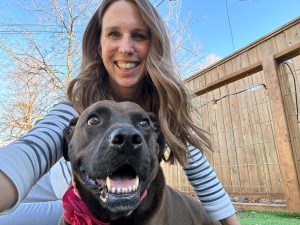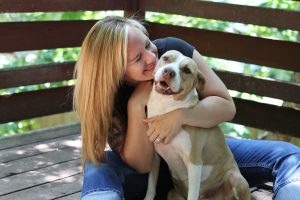Oklahoma Bar Journal
A Conversation With an Animal Law Practitioner
By Charis L. Ward and Katie Bray Barnett

Charis L. Ward and her dog, Gidget
Animal law – it has been taught in more than 167 law schools in the U.S. and Canada.[1] At the time this article was written, two of the three law schools in Oklahoma offered at least one course involving animal law.[2] An LL.M. and an S.J.D. are available in animal law, and there are several academic programs, clinics and centers on the topic worldwide.[3] The American Bar Association and at least 35 state bar associations (including Oklahoma) have a committee or section dedicated to animal law, but what exactly does the practice of animal law look like?[4]
The following article is an interview with Katie Bray Barnett. Ms. Barnett is the immediate past chair of the ABA Animal Law Committee (ALC) of the Tort Trial & Insurance Practice Section and is licensed to practice law in Kansas and Missouri. She has been a member of the ALC since she was a law student and is now in her 12th year as a member. Her private practice consists entirely of animal law matters, representing animal shelters and animal control agencies, acting as special prosecutor for animal-related crimes and civil actions for animal-related issues. She resides in northeast Kansas with her husband, two children and two dogs.
I’ve never heard of a law firm that practices animal law. Please tell me a little bit about you and your firm.
I'm in such a unique position because I stumbled into the legal field as an undergrad working in the city attorney’s office and then worked in big law as a litigation paralegal. Then I was personally affected by breed-specific legislation when animal control tried to impound my dog simply because of her appearance. So, by the time I made the decision to go to law school, I was an older, nontraditional student but one with experience and personal drive to serve in public interest law, specifically animal law.
Are you a solo practitioner?
For the first decade of my practice, I was a solo practitioner with legal interns, externs and seasonal staff, but it soon became unsustainable at the rate of intakes I was getting. My practice now employs three attorneys, a practice manager and a social media manager – because who doesn't want to see all the cute animals we get to help?!
How long have you practiced animal law?
I have practiced animal law since I became licensed in 2012. I had an opportunity to be a contract lobbyist while in law school for a national animal welfare organization, which helped me have the requisite experience to jump right into animal law as soon as I passed the bar. I often hear from attorneys who dabble in animal law alongside their primary practice, which is a great way to break into this practice area. What's fun is that animal law reaches every practice area – from land use and zoning to criminal, you'll find opportunities to practice animal law anywhere, so long as you demonstrate an interest in it.
Who are your clients?
My primary clients are animal shelters and animal control agencies in Kansas and Missouri. I am so lucky to represent most of the animal welfare organizations in the Kansas City metro area. Each one has a unique population they serve, with missions that vary from one another. It is a constant exercise in meeting client needs and providing unique industry expertise to protect the organization while also ensuring public safety. Some of our clients enforce animal-related ordinances and statutes, so we often advise on investigations and prosecution and occasionally get the opportunity to serve as special prosecutors in high-profile criminal cases. Every once in a while, we have a client who needs representation on the defense side of an animal control ordinance – most often, it is a small community with an enforcement officer who doesn’t quite understand the local animal ordinance or an overzealous prosecutor threatening to euthanize a client’s dog. On the other end of the spectrum, our civil work includes individual custody disputes (roommates, partners, companies refusing to return animals after providing a service, etc.), negligence (e.g., injury or death to an animal by a neighbor or an animal industry provider) and, recently, a complex products liability case!

Katie Bray Barnett and her dog, Katrina, whom she rescued during recovery efforts after Hurricane Katrina
What is a typical day like for you?
My days often start with my kids waking me before the sun is up. Each day, I have a handful of regularly scheduled meetings with my shelters. These meetings often review animals on hold by animal control, the shelter or the courts. We meet to ensure the swift disposition of animals, including sending notices or filing petitions. With our animal shelters serving so many jurisdictions, I usually have some contract, presentation or policy I'm working on and the occasional employee matter to advise on. Often, I bounce to civil litigation or criminal prosecution when I have a court appearance or pleading to work on. I also teach business and animal law, depending on the semester, so I will have a lecture to prepare or a writing assignment to grade. In between all this, inevitably, there is an urgent matter with an animal that either needs to be seized or has been seized for cruelty or an animal bite or urgent animal release questions that come my way. I also work on housing issues in my community, so each day, I either have a meeting, prepare for a meeting, advise on a case or work on some aspect of a strategic plan for pets and people in housing matters. It can be difficult shifting practice areas minute by minute, but my workdays are never boring, and each and every day is rewarding. I absolutely love what I do.
What led you to establish a law firm with an emphasis on animal law matters?
I grew up in a household of adopted dogs. During the recovery efforts after Hurricane Katrina, my best friend and I traveled down south, where we volunteered with the animals found and helped reunite them with their families. One little dog wasn't reunited and came back to Kansas with me. One day, an animal control officer showed up at my door and declared she looked too much like a "pit bull." I wasn't familiar with breed-specific legislation, but working at a law firm, I was certain an ordinance that prohibited you from owning a dog based solely on the way it looks wasn't constitutional. This became an area of advocacy for me, and eventually, I decided I wanted to go to law school to change these ordinances and laws. Fortunately, Oklahoma has a state statute that preempts local governments from enacting and regulating dogs based on breed.
What is the best/most challenging aspect of practicing animal law?
The most challenging aspect of practicing animal law is that there often isn't solid case law on point with a question of law that we have. This means often pulling cases from the East or West Coast, reaching to other forms of personal property to compare an animal to (like a wedding ring or car) and urging judges to create new laws on these cases of first impression. All of this can make judges and juries nervous, so we really have to fight hard to demonstrate that a change is needed.
The best part about my job is my clients. We have a mutual goal of either seeking justice or seeking policy change for animals, and we get to work collaboratively, which isn't always the case in the practice of law (but, in my opinion, should be). I so enjoy getting updates from clients, holiday cards with pictures and hugs. Getting thank yous and hugs from law enforcement and clients is truly the best feeling.
What advice would you give to a lawyer wanting to either start a similar practice or incorporate animal law into a current practice?
You can practice animal law in any practice area. All you have to do is take the initiative! Get speakers for your local bar association, join the OBA Animal Law Section and join the ABA Animal Law Committee through the Tort Trial & Insurance Practice Section.
Can you recommend any resources for attorneys wanting to learn more about animal law?
The best resources are other attorneys who practice animal law. I annoyingly reach out to other animal law attorneys across the country on almost every new issue I work on. I am always reaching out for the knowledge of the brilliant practitioners in the practice area. Having those contacts comes from the bar association memberships I have and the events I excitedly attend to learn from experts in my field.
CONCLUSION
Just as animals are intertwined in nearly all aspects of daily life, so is animal law. As this article shows, it is its own legal discipline, as well as a part of several traditional areas of law, including but not limited to administrative, business, constitutional, contract, criminal, employment, environmental, family and tort law. Animal law is robust, dynamic and quickly evolving and may have a place in your practice.
ABOUT THE AUTHORS
 Charis L. Ward is an Oklahoma attorney who focuses on animal and real property law. She is the current vice chair of the OBA Animal Law Section and a member of the OBA Real Property Law Section and Title Examination Standards Committee, the ABA Animal Law Committee and Companion Animals Subcommittee and the Oklahoma City Real Property Lawyers Association. She and her husband are the proud “paw”rents of three purebred mutts: Gidget, Astro and Josh, aka Mr. Wigglesworth.
Charis L. Ward is an Oklahoma attorney who focuses on animal and real property law. She is the current vice chair of the OBA Animal Law Section and a member of the OBA Real Property Law Section and Title Examination Standards Committee, the ABA Animal Law Committee and Companion Animals Subcommittee and the Oklahoma City Real Property Lawyers Association. She and her husband are the proud “paw”rents of three purebred mutts: Gidget, Astro and Josh, aka Mr. Wigglesworth.
 Katie Bray Barnett received her J.D. from the University of Kansas School of Law and founded the school’s Student Animal Legal Defense Fund. Her legal practice consists of animal and municipal law, law enforcement training on animals and legislative action. Ms. Barnett teaches animal law at the University of Missouri-Kansas City School of Law. She is the immediate past chair of the ABA Animal Law Committee and has authored two ABA resolutions focusing on animal law and two law review articles on breed-specific legislation.
Katie Bray Barnett received her J.D. from the University of Kansas School of Law and founded the school’s Student Animal Legal Defense Fund. Her legal practice consists of animal and municipal law, law enforcement training on animals and legislative action. Ms. Barnett teaches animal law at the University of Missouri-Kansas City School of Law. She is the immediate past chair of the ABA Animal Law Committee and has authored two ABA resolutions focusing on animal law and two law review articles on breed-specific legislation.
ENDNOTES
[1] https://bit.ly/3HW88wM. (Last accessed Feb. 1, 2024).
[2] OCU School of Law and the OU College of Law.
[3] Nonexclusive list: Lewis & Clark Law School, Vermont Law and Graduate School, Animal Law & Policy Program Harvard Law School, Cambridge Centre for Animal Rights Law, University of Michigan Law School, Sturm College of Law, New York University School of Law, Northwestern University Pritzker School of Law, UC Berkeley School of Law, Stanford Law School, Georgetown Law School, University of Pennsylvania Carey Law School and University of Virginia School of Law.
[4] https://bit.ly/3wkFNxB (Last accessed Feb. 1, 2024).
Originally published in the Oklahoma Bar Journal – OBJ 95 No. 3 (March 2024)
Statements or opinions expressed in the Oklahoma Bar Journal are those of the authors and do not necessarily reflect those of the Oklahoma Bar Association, its officers, Board of Governors, Board of Editors or staff.
